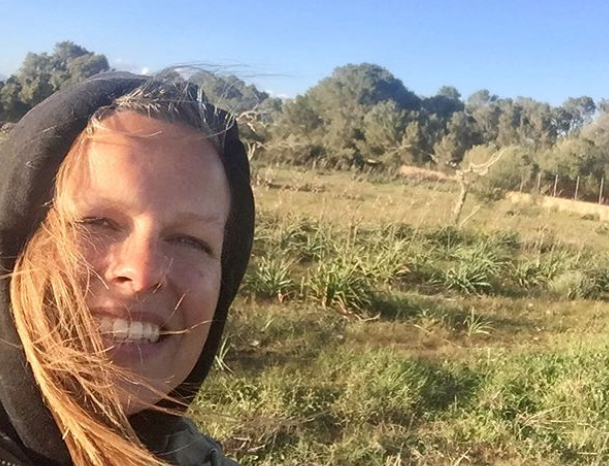“Paris says: We are here for such a short time. We might as well sit down for a long while with some good coffee, company, and bread. Here, there is more time to be human, maybe because there has been more time to learn how.” ~ Glennon Doyle
~
In this Spanish village where I live, it wasn’t toilet paper that people were stacking away during lockdown, as people did in the Netherlands, my native country.
No, it was flour. Flour to bake bread, cakes, and pizza.
As we all had to stay in our houses and my only weekly visit was to the local supermarket, I felt suddenly there was an abundance of time. So, “let’s cook!” many fellow villagers must have thought (me included).
Like in all South European countries, food is more than just food. It’s more than just adding fuel to our bodies.
It’s a social act, an occasion to come together and spend hours eating, drinking, and chatting. Not a quick cheese sandwich for lunch, but a warm home-cooked meal, preferably served with a chilled glass of wine.
People here take the time to eat.
Especially on Sundays. Some of the Spanish families go out for lunch—the grandmothers and grandfathers well-dressed, hair tidy, in the company of their little granddaughters in white summer dresses. Fathers and mothers and brothers and sisters.
It always makes me smile when I witness these small scenes from a Spanish life.
When they’re not going out to eat, they stay home and gather.
Family life is an important value here—it’s cherished greatly by the young and the elderly. Therefore the impact of the lockdown on families that couldn’t visit each other shouldn’t be taken lightly.
It’s so normal to see groups of men and women of old age walking on the streets or sitting together on plastic chairs having conversations. The elderly are part of society, they still have important roles in life.
Where old age is often seen as a burden by Western society, and is even something to hide from, there’s another perspective in Mediterranean countries: the grandmothers and grandfathers still count—even more—because they have a bunch of experiences the young ones can learn from.
They won’t get tucked away in “rest homes”so easily.
It’s accepted to be old in Spain and families are here to give support.
Family is here to come together and eat together, even when grandpa or grandma walk with bent backs, carrying all their life lessons as a heavy load—every step is a milestone to celebrate. Their presence is important.
It’s a part of Spanish culture that I deeply love. The further south we go, the more life is like this. And the more I miss my Dutch family.
One of the things I discovered from moving to the Mediterranean six years years ago, is that I actually like to cook. Before, cooking had to be done quickly, out of necessity, as I always felt hungry when I arrived home late from work. Cooking something simple and fast, but still healthy, had to fix my “hunger.”
I didn’t want to spend much time on cooking, as I didn’t have that much time—or didn’t take the time. Just as I didn’t take the time to buy better ingredients.
It never occurred to me to find an organic farm or shop to get my vegetables and free-range eggs from. Eggs that aren’t from chickens that only have a window to look out from, yet are still called “free-range” in the supermarket.
I didn’t use my valuable time to buy real food instead of fake food.
Things have changed now; the supermarket is only for toilet paper and a few other standard things. I don’t follow the regular food system anymore, and on glorious days I feel like a rebel for doing this.
I’m not shouting on the streets (I probably should!), but I’m silently resisting a system that sells us genetically modified grain, pesticide-sprayed vegetables, and antibiotics-injected meat and poultry—and I’m constant learning about these topics.
My “silent resistance” started when I changed my life into a “slow life,” as life is super slow on the rural part of the island where I live. Life here isn’t about constant productivity or how many tasks I give a proud “check” to and consider “done” on my to-do list.
This may sound like a luxury to some people who simply don’t have time and hardly can keep their heads above water, let alone think of ways to improve their food habits. To others, who are attached to their busyness, it may sound boring as hell, since they have far more important things to do than think about sustainable food.
During the Spanish lockdown due to the coronavirus, we were only allowed on the streets to go to the supermarket, the pharmacy, or to give care to an elderly person.
So we were at home most of the time, and what did many people do? Cook and bake.
Flour had been sold out for days in a row. I guess we cooked and enjoyed our homemade meals to help us through uncertain times. Maybe we baked almond cakes for consolation, but to me it was the simple things that gave comfort, such as baked, crispy potatoes with fresh rosemary from the garden.
It reminded me of a friend and vegan chef, who once asked her students (I was one of them), during a plant based-cooking workshop how they would describe their relationship with food.
What do we feel when seeing and touching the ingredients? The fresh vegetables from the garden—how do they taste? Do we feel a connection with the food? Do we appreciate it? Do we feel nourished, not only our bodies, but our souls as well?
These questions are helping me to be more conscious when I cook.
I discovered conscious cooking with sustainable ingredients is lifesaving.
Food is much more than eating and adding energy to our bodies. It’s about taking care of ourselves and others. It’s medicine. It’s about connecting—with our body and with the people around us.
When we consciously decide what to eat, it’s even a political act.
But most of all, food brings people together when—just for a moment—time seems endless and we stop doing and just be.
~









Read 2 comments and reply